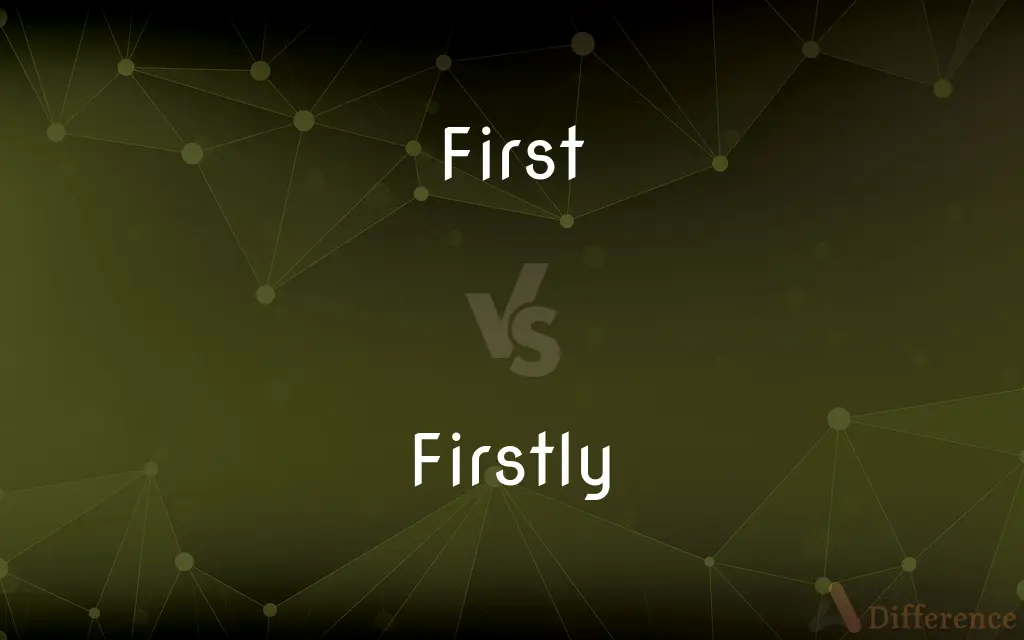First vs. Firstly — What's the Difference?
By Fiza Rafique & Urooj Arif — Updated on March 7, 2024
"First" is an adjective or adverb denoting the initial position or order, while "firstly" is an adverb used specifically in enumerating points.

Difference Between First and Firstly
Table of Contents
ADVERTISEMENT
Key Differences
"First" is an adjective or adverb denoting the initial position or order, while "firstly" is an adverb used specifically in enumerating points.
First serves as both an adjective and an adverb, indicating the initial element or position in a sequence or order. As an adjective, it describes the noun following it, such as in "first place." As an adverb, it modifies verbs, adjectives, or other adverbs, often used in instructions or listing items, such as "First, preheat the oven." On the other hand, firstly is used exclusively as an adverb in lists or sequences, primarily in formal writing or speeches to introduce the initial point or argument, as in "Firstly, let's consider the facts."
While "first" can be used interchangeably with "firstly" as an adverb, the latter is more formal and less common in everyday language. "First" is more versatile and widely accepted in both formal and informal contexts. For instance, "First, I will address your question" is preferred over "Firstly, I will address your question" in many styles of English.
The choice between "first" and "firstly" can depend on stylistic preferences, with some guides and individuals preferring the more traditional "firstly" in formal or academic writing. However, it's important to remain consistent in usage throughout a piece of writing, choosing either "first, second, third" or "firstly, secondly, thirdly."
In summary, "first" is more commonly used and accepted in various contexts, while "firstly" is often reserved for more formal or structured enumerations. Despite their differences, both serve the purpose of indicating the beginning of a list or sequence of points.
ADVERTISEMENT
Comparison Chart
Part of Speech
Adjective, Adverb
Adverb
Usage
Indicates initial position/order, more versatile
Introduces first point in a list, more formal
Context
Both formal and informal, wider acceptance
Primarily formal or academic writing
Example (Adjective)
"He won the first prize in the competition."
N/A
Example (Adverb)
"First, we need to gather all the necessary tools."
"Firstly, we must understand the underlying issue."
Compare with Definitions
First
In the first place. primarily.
First, we need to secure funding for the project.
Firstly
As the first point. introducing the first item in a list.
Firstly, I'd like to thank everyone for attending.
First
Preceding all others in time, order, or importance.
She received the first prize for her science project.
Firstly
Used to specify the initial reason or argument.
Firstly, the study's methodology was flawed.
First
For the first time.
I first met him in Paris.
Firstly
Signaling the start of an enumeration or argument.
Firstly, it's important to establish clear objectives.
First
As the initial point or reason.
First, the data supports our hypothesis.
Firstly
Denoting the beginning of a series or list.
Firstly, we will discuss the budget, followed by the schedule.
First
Before anything else. initially.
First, let's review the agenda for today's meeting.
Firstly
In the first instance. as the primary consideration.
Firstly, customer satisfaction is our top priority.
First
The ordinal number matching the number one in a series.
Firstly
In the first place; to begin with; first.
First
The one coming, occurring, or ranking before or above all others.
Firstly
(formal) In the first place; before anything else; first.
First
The beginning; the outset
From the first.
At first.
Firstly
In the first place; before anything else; - sometimes improperly used for first.
First
(Music) The voice or instrument highest in pitch or carrying the principal part.
Firstly
Before anything else;
First we must consider the garter snake
First
The transmission gear or corresponding gear ratio used to produce the range of lowest drive speeds in a motor vehicle.
First
The winning position in a contest
Finished the season in first.
First
First base.
First
A first baseman.
First
Corresponding in order to the number one.
First
Coming before all others in order or location
The first house on your left.
First
Occurring or acting before all others in time; earliest
The first day of spring.
First
Ranking above all others, as in importance or quality; foremost
Was first in the class.
First
(Music) Being highest in pitch or carrying the principal part
First trumpet.
First
Of, relating to, or being the transmission gear or corresponding gear ratio used to produce the range of lowest drive speeds in a motor vehicle.
First
Of, related to, or being a member of the US president's household
First daughter Sasha Obama.
First
Before or above all others in time, order, rank, or importance
Arrived first.
Forgot to light the oven first.
First
Rather; preferably
Would die first.
First
In the first place; to begin with; firstly.
First
Preceding all others of a series or kind; the ordinal of one; earliest.
Hancock was first to arrive.
The first day of September 2013 was a Sunday.
I was the first runner to reach the finish line, and won the race.
First
Most eminent or exalted; most excellent; chief; highest.
Demosthenes was the first orator of Greece.
The first violinist
First
Of or belonging to a first family.
First
Before anything else; firstly.
Clean the sink first, before you even think of starting to cook.
I plunged nose first into the water.
First
Now.
First
(uncountable) The person or thing in the first position.
He was the first to complete the course.
First
(uncountable) The first gear of an engine.
First
(countable) Something that has never happened before; a new occurrence.
This is a first. For once he has nothing to say.
First
First base
There was a close play at first.
First
A first-class honours degree.
First
A first-edition copy of some publication.
First
(in combination) A fraction whose (integer) denominator ends in the digit 1.
One forty-first of the estate
First
(obsolete) Time; time granted; respite.
First
Preceding all others of a series or kind; the ordinal of one; earliest; as, the first day of a month; the first year of a reign.
First
Foremost; in front of, or in advance of, all others.
First
Most eminent or exalted; most excellent; chief; highest; as, Demosthenes was the first orator of Greece.
It is the intention of the person to reveal it at first hand, by way of mouth, to yourself.
See, Father, what first fruits on earth are sprungFrom thy implanted grace in man!
First
Before any other person or thing in time, space, rank, etc.; - much used in composition with adjectives and participles.
Adam was first formed, then Eve.
And all are fools and lovers first or last.
First
The upper part of a duet, trio, etc., either vocal or instrumental; - so called because it generally expresses the air, and has a preëminence in the combined effect.
First
The first or highest in an ordering or series;
He wanted to be the first
First
The first element in a countable series;
The first of the month
First
The time at which something is supposed to begin;
They got an early start
She knew from the get-go that he was the man for her
First
The fielding position of the player on a baseball team who is stationed at first base
First
An honours degree of the highest class
First
The lowest forward gear ratio in the gear box of a motor vehicle; used to start a car moving
First
Preceding all others in time or space or degree;
The first house on the right
The first day of spring
His first political race
Her first baby
The first time
The first meetings of the new party
The first phase of his training
The last time I saw Paris
The last day of the month
Had the last word
Waited until the last minute
He raised his voice in a last supreme call
The last game of the season
Down to his last nickel
First
Indicating the beginning unit in a series
First
Serving to set in motion;
The magazine's inaugural issue
The initiative phase in the negotiations
An initiatory step toward a treaty
His first (or maiden) speech in Congress
The liner's maiden voyage
First
Serving to begin;
The beginning canto of the poem
The first verse
First
Ranking above all others;
Was first in her class
The foremost figure among marine artists
The top graduate
First
Highest in pitch or chief among parts or voices or instruments or orchestra sections;
First soprano
The first violin section
Played first horn
First
Being the gear producing the lowest drive speed;
Use first gear on steep hills
First
Before anything else;
First we must consider the garter snake
First
The initial time;
When Felix first saw a garter snake
First
Before another in time, space, or importance;
I was here first
Let's do this job first
Common Curiosities
Is "first" acceptable at the beginning of a sentence?
Yes, "first" can be used at the beginning of a sentence to introduce a point or step, e.g., "First, we will consider the evidence."
Is "firstly" more correct than "first" in formal writing?
"Firstly" can be more formal, but "first" is widely accepted in both formal and informal contexts. The choice often depends on stylistic preference.
Can "first" be used in numerical sequences?
Yes, "first" is often used in numerical sequences, e.g., "He finished first in the race."
Is it grammatically incorrect to start a sentence with "Firstly"?
No, it's not grammatically incorrect, but ensure it introduces a list or series of points for consistency and clarity.
Should I use "firstly" when listing items in an essay?
You can use "firstly" in more formal or structured writing, but "first" is also acceptable. Consistency with subsequent points (secondly, thirdly) is key.
How can I maintain consistency when using "first" or "firstly" in a series?
If you start with "firstly," continue with "secondly," "thirdly," etc. If you start with "first," follow with "second," "third," etc.
Can "first" be used in non-sequential contexts?
Yes, "first" can indicate precedence or priority without implying a sequence, e.g., "His first concern was safety."
How do I decide whether to use "first" or "firstly" in my writing?
Consider your audience and the formality of your writing. "First" is more universally acceptable, but "firstly" might suit academic or very formal contexts.
Do other languages have similar distinctions between "first" and "firstly"?
Some languages have distinctions between adverbs and adjectives similar to "first" and "firstly," but the usage rules can vary widely.
Are there contexts where "first" is preferred over "firstly"?
In informal writing or speech, "first" is generally preferred due to its simplicity and broader acceptance.
Can "firstly" be used at the end of a sentence?
It's unusual and not stylistically preferred; "firstly" typically introduces statements rather than concluding them.
Can I use "first" and "firstly" interchangeably?
While they can sometimes be used interchangeably as adverbs, it's important to maintain consistency in your writing. Choose one style and stick with it.
What are synonyms for "first" and "firstly" that can be used to vary language?
Alternatives include "initially," "to begin with," or "to start."
Is there a difference in using "first" or "firstly" in British vs. American English?
Usage can vary, but "first" is commonly accepted in both varieties, while "firstly" might be seen more in British English.
How does the use of "first" or "firstly" affect the tone of a piece of writing?
"Firstly" can lend a formal or academic tone, while "first" is more neutral and versatile, suitable for a wide range of tones.
Share Your Discovery

Previous Comparison
Health vs. Illness
Next Comparison
Polyethene vs. PolyethyleneAuthor Spotlight
Written by
Fiza RafiqueFiza Rafique is a skilled content writer at AskDifference.com, where she meticulously refines and enhances written pieces. Drawing from her vast editorial expertise, Fiza ensures clarity, accuracy, and precision in every article. Passionate about language, she continually seeks to elevate the quality of content for readers worldwide.
Co-written by
Urooj ArifUrooj is a skilled content writer at Ask Difference, known for her exceptional ability to simplify complex topics into engaging and informative content. With a passion for research and a flair for clear, concise writing, she consistently delivers articles that resonate with our diverse audience.














































